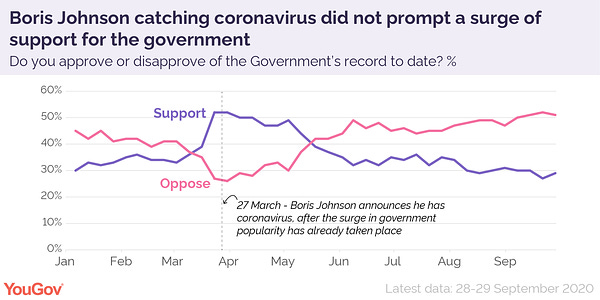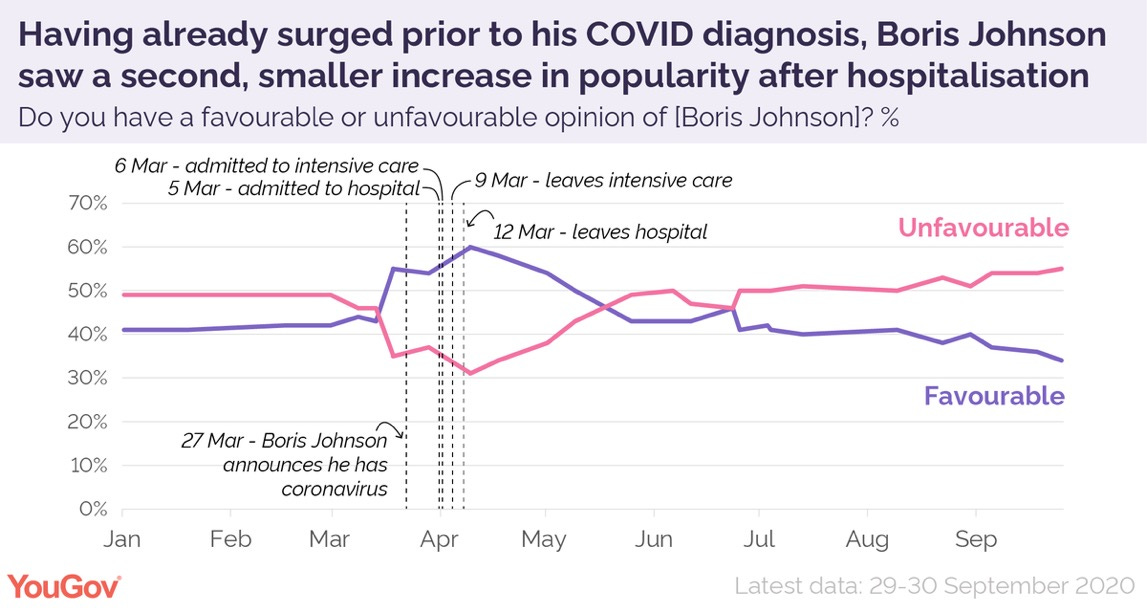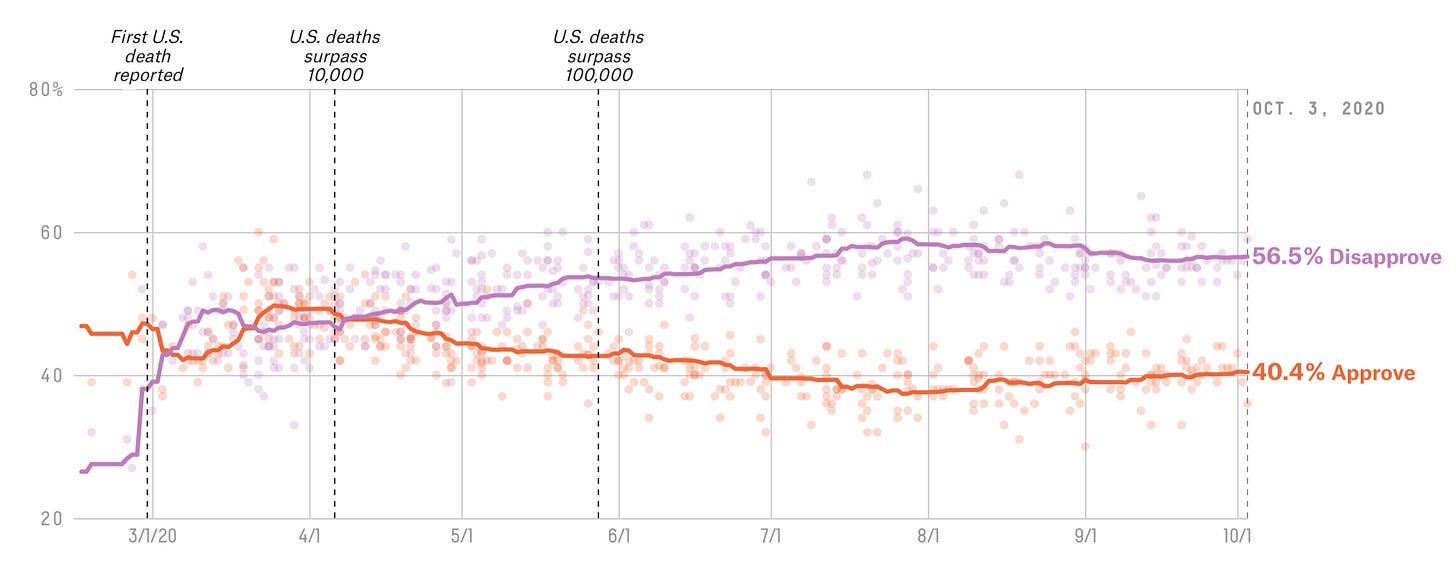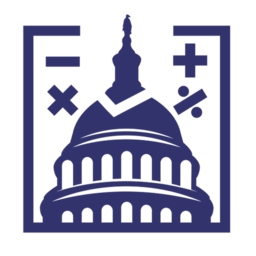How Trump's positive covid-19 test might impact the election
A few ways of thinking about the future
I was thrown for quite a loop Friday morning when I woke up and saw that the president has tested positive for covid-19. Although it is not quite surprising—it was maybe even probable, as his habit of travelling to rallies and golf courses without wearing a mask or social distancing puts him at high risk—he is still so high a profile case that the diagnosis did catch me off guard. I have spent much of today trying to figure out how this may impact the presidential race.
Editor’s Note: This is a paid post for premium subscribers. If you are a subscriber and have friends or family that you think might learn something from this post, you should feel open to forward it to them regardless of their membership—though I request that you also urge them to sign up for posts by clicking the button below:
Let’s start with one enormous caveat, which is that if Trump is somehow incapacitated and cannot serve as president then we’ve entered completely unknown — and un-forecastable — territory. That would amount to quite the shock to the political system, and we’d be so far outside normal rules that any historical or mental model is going to have a hard time foreseeing the future.
So the question we’re really asking is how Trump’s positive test will shape the race under reasonably similar conditions than the ones today. That’s a narrower question—and, importantly, one we can actually reckon with. So here are the ways that I’m thinking about Trump’s covid diagnosis.
Polls show small bounces after other world leaders contracted covid-19
The first way we can gaze into the crystal ball is by looking at how approval ratings for other world leaders have changed after they tested positive for covid. First up on our list is Boris Johnson, who got the coronavirus in April. In the 2-3 weeks after his announcement and hospitalization, YouGov did not find an increase in support for his government. In fact, if anything support for Johnson and his cabinet fell after he announced the had contracted the virus:


But YouGov did pick up a increase in Johnson’s personal favorability numbers, which ticked up from around 55 to 60% in the weeks following the announcement that he had covid.

This example alone suggests that Trump should get a modest but temporary boost to his personal favorability or approval ratings, but he probably won’t see a boost in vote-intention polls.
In Brazil, Jair Bolsonaro contracted the virus shortly before July 7th, the date that he announced he had the disease. According to Morning Consult, his approval rating fluctuated between 45 percent 47 percent over the next month. That would suggest a null boost for the president.
However, there are several caveats to drawing inferences from these examples. First is the massive caveat that they are only two cases, in wildly different countries, with different political systems, at different points in the election/political cycle. Trump getting covid right before the election is at least somewhat different than falling ill in say, July.
And that brings up a second caveat, which is that Johnson’s poll boost happened concurrently with a wave of increased support for governments around the world when covid was first getting serious in the spring. You can see that in YouGov’s trends for his approval ratings, which were trending up before he announced he had covid-19 — in fact, if anything the positive trend in his ratings flattened out after the announcement.
The best thing we can say here is that contracting covid-19 made at best a small and probably no difference on Boris Johnson and Jair Bolsonaro’s approval ratings. We ought to expect something similar for Trump.
Trump’s approval on handling covid-19 is low; reminding voters of the virus may hurt him
Another thing to consider is that voters by and large disapprove of how President Trump has handled the coronavirus — and reminding them of his performance by falling ill himself may not be a good look.
According to Gallup, the coronavirus is the number one issue on voters minds today — more important than jobs or the economy. And just as many people think that problems with the government/poor leadership are also an issue. And according to An average of polls from FiveThirtyEight, the president is 16 percentage points underwater on how he has handled covid-19.

If I were the president, I wouldn’t be happy that the news cycle is 100% coronavirus again right now.
Still, Trump’s positive test is not particularly revelatory, and the 2020 race has been stable
But there remains the stubborn fact that Trump getting covid-19 is not all that surprising — again, he has been repeatedly photographed and video-taped breaking federal guidelines on distancing and mask-wearing — and it doesn’t tell us much more than we already know.
In the end, Trump’s diagnosis is perhaps the most illustrative event to occur so far in 2020. I guess we were always destined to have covid-19 be the dominant subject at the end of an election year in which a preventable diseases has claimed over 200,000 lives. And the president’s own illness reminds voters that he is unable to handle the issue resolutely. Those of us that have already factored that into our votes will not be surprised.
In fact the polls have been remarkably stable for all the surprises that have happened this year. Of course, the sitting president of the United States getting a deadly disease is somewhat different than the other punctuations in the campaign, but most of the signs point to that not mattering much anyway. The president is down in the polls by 8-9 points today: exactly where he has been since early June. I don’t imagine that reminding voters how unpopular his main issue is is going to aide him that much.
A few other considerations
Of course, this is all speculation — and that will only get us so far. The best thing we can do is just wait for the polling data to roll in.
Yet analyze the polls after the president’s diagnosis won’t be that clear-cut. His sickness has the ability to cause Republicans to become disengaged with politics for a few days or weeks — a pattern that pollsters call “partisan non-responses bias.” Often after events that are disproportionately good or bad for a party their supporters won’t want to take political surveys. If that happens it could cause a phantom swing away from Trump among pollsters who don’t weight their polls to have the approximate number of Republicans or Democrats, or 2016 Clinton/Trump voters.
Another issue is that Trump’s diagnosis is only the latest high-profile event in a few weeks that have been jam-packed with news. The passing of Ruth Bader Ginsburg and the presidential debate last Tuesday come to mind. These events tend to pile on top of each other in the public consciousness, making it hard to know what is really shaping peoples’ decisions when the polls change. And from a statistical point of view, unless we had multiple large-sample polls from the same firms being released nationally every single day, it is also impossible to attribute any moment in the polls to specific events.
…
It’s a lazy way to end a piece, but in the end, we’ll just have to wait for the polls to see how people react to Trump testing positive for covid. From what I’ve hard from pollsters both on off the record, things could be shifting modestly toward Joe Biden. That certainly fits my priors.



